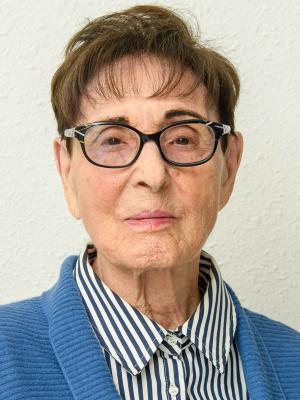Malka Rendel was born in 1927 in the town of Nagyecsed in Hungary, the youngest in an Orthodox family of eight. Malka's father, David-Aaron Freundlich, was killed in an accident before her birth, and her mother Sara ran the family's fabric store after his death. Her two older siblings immigrated to Eretz Israel before WWII.
Upon entering the town in 1944, the Germans closed Jewish-owned shops, forbade the Jews to trade and ordered them to wear the Yellow Star. Malka was assigned the humiliating task of cleaning the street in front of her Hungarian friends.
In May 1944, the Jews of the city were deported to the Mátészalka ghetto. The entire extended family lived in one apartment.
Three weeks later, Malka and her family were deported to Auschwitz in a cattle car – a journey of about six days. On arrival, Malka tried to grab hold of her mother and one of her sisters, but most of the family was sent to one side and Malka and her sisters, Miriam and Rachel, were sent to the other. Her mother gave her two cookies and told her sisters: "Take care of Malka." Of all the family members, only Malka, Miriam and Rachel survived the selection.
After three months, Malka and her sisters were sent to the Płaszów concentration camp, where they labored in a quarry carrying stones with their bare hands, in the freezing cold. People around them were constantly killed by rock explosions. The three were returned to Auschwitz and from there they were sent to Neustadt, to a factory for weaving parachutes.
On Hanukkah, the women stole oil and threads to light makeshift candles. "It made it feel like home, that they didn't take everything from us," says Malka.
As the Red Army approached, Malka and her sisters were forced on a death march to the Gross-Rosen concentration camp. Prisoners who could not continue walking were shot. At night they slept in each other's arms to keep warm. In order to survive, Malka imagined her mother, her home and the foods she used to eat.
Malka and her sisters were transferred to Bergen-Belsen, where Miriam and Rachel died. They were thrown through the window onto a pile of corpses. "That memory still haunts me," Malka cries. "Mother told them to look after me, and they gave me their bread. If I hadn't eaten it, maybe they would have survived".
"Sometimes I can't believe I went through all this. Then I roll up my sleeve and look at the number on my arm, which proves to me that it did happen".
After liberation, Malka was transferred to Sweden, where she was hospitalized. She took Zionism and Hebrew classes from emissaries who came from Eretz Israel (Mandatory Palestine), in a school established for the survivors.
Malka boarded a refugee ship to Eretz Israel, but was caught and imprisoned in the British detention camps in Cyprus, where she continued to study Hebrew until her eventual immigration. She became a teacher, and after she retired, she taught Hebrew to new immigrants.
Malka and Yehoshua have three daughters, eleven grandchildren, 36 great-grandchildren and one great-great-grandson.







